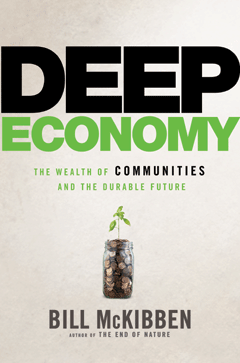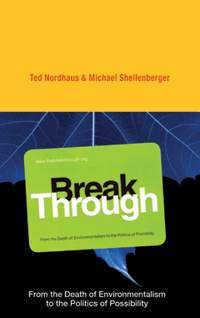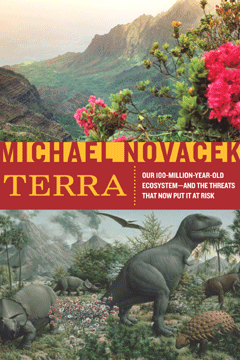Hot Book Picks
Air Date: Week of November 23, 2007

Bill McKibben's "Deep Economy: The Wealth of Communities and the Durable Future" (Photo: Henry and Holt Co.)
From climate solutions to climbing trees....Outside magazine contributing editor Bruce Barcott tells us what’s on his list of the best environmental books of 2007.
Transcript
CURWOOD: It’s Living on Earth. I’m Steve Curwood. If you’re thinking of some gifts to buy for friends and family this holiday season, you might want to take a listen to Bruce Barcott. He’s a contributing editor of Outside magazine and he’s got some suggestions if you’d like to give those folks some brain food, otherwise known as books. Here’s Bruce Barcott’s list of favorite environmental books for 2007.
BARCOTT: Last year, bookstores were full of titles that documented global warming. This year, we moved on to books that told us what to do about it. The best of the bunch was “Break Through,” by Michael Shellenberger and Ted Nordhaus. Three years ago the authors raised a ruckus with their provocative essay, “The Death of Environmentalism.”

Ted Nordhaus and Michael Shellenberger's "Break Through: From the Death of Environmentalism to the Politics of Possibility" (Photo: Houghton Mifflin Company)

Bill McKibben's "Deep Economy: The Wealth of Communities and the Durable Future"(Photo: Henry and Holt Co.)
The year’s best book of natural history is paleontologist Michael Novacek’s “Terra.” Novacek lays out the story of life on Earth, from the first single-celled organisms to those strange hominids known as you and me. Novacek’s specialty is evolution and extinction, and his book makes it clear that habitat loss and global warming are bringing about the kind of mass extinction that hasn’t been seen since a killer asteroid wiped out the dinosaurs.

Michael Novacek's "Terra: Our 100-Million-Year-Ols Ecosystem- and the Threats That Now Put It At Risk"
(Photo: Farrar, Straus and Giroux)
Dangerous, but also glorious. For me, 2007 will be the year that Richard Preston inspired me to quit hugging trees and start climbing them.
CURWOOD: Bruce Barcott climbs trees in Boulder, Colorado and reviews books for Outside magazine and The New York Times Book Review. His own book, "The Last Flight of the Scarlet Macaw," will be published by Random House early next year.
Links
Bill McKibben's "Deep Economy: The Wealth of Communities and the Durable Future"
Richard Preston's "The Wild Trees: A Story of Passion and Daring"
Living on Earth wants to hear from you!
Living on Earth
62 Calef Highway, Suite 212
Lee, NH 03861
Telephone: 617-287-4121
E-mail: comments@loe.org
Newsletter [Click here]
Donate to Living on Earth!
Living on Earth is an independent media program and relies entirely on contributions from listeners and institutions supporting public service. Please donate now to preserve an independent environmental voice.
NewsletterLiving on Earth offers a weekly delivery of the show's rundown to your mailbox. Sign up for our newsletter today!
 Sailors For The Sea: Be the change you want to sea.
Sailors For The Sea: Be the change you want to sea.
 The Grantham Foundation for the Protection of the Environment: Committed to protecting and improving the health of the global environment.
The Grantham Foundation for the Protection of the Environment: Committed to protecting and improving the health of the global environment.
 Contribute to Living on Earth and receive, as our gift to you, an archival print of one of Mark Seth Lender's extraordinary wildlife photographs. Follow the link to see Mark's current collection of photographs.
Contribute to Living on Earth and receive, as our gift to you, an archival print of one of Mark Seth Lender's extraordinary wildlife photographs. Follow the link to see Mark's current collection of photographs.
 Buy a signed copy of Mark Seth Lender's book Smeagull the Seagull & support Living on Earth
Buy a signed copy of Mark Seth Lender's book Smeagull the Seagull & support Living on Earth

